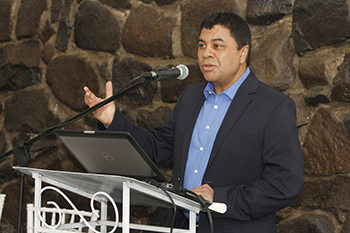
UFS Rector and Vice-Chancellor Prof Francis Petersen
presents the welcoming address at the 2017 HEMIS Institute
in Bloemfontein.
Photo: Eugene Seegers
Higher education institutions such as universities need information and accurate data to make critically important management decisions. Prof Francis Petersen, Rector and Vice-Chancellor of the University of the Free State (UFS), expressed these sentiments during his introduction at the 2017 HEMIS Institute recently held in Bloemfontein.
Reporting a critical part of HE practice
The Department of Higher Education and Training (DHET) uses its Higher Education Management Information System (HEMIS) to manage and verify performance data from Higher Education Institutions (HEIs) regarding four crucial datasets, namely students, staff, space, and postdoctoral information and research fellows. HEMIS data is collected for quality control, funding, and planning purposes, in particular for steering the system and for monitoring the sector. This data must then be audited, since it is used for subsidy allocations to HEIs.
“Institutional reporting on aspects of what we do as public universities is a critical part of practice in Higher Education,” said Prof Petersen. He added, “Whether about insourcing statistics, … student accommodation, or transformation and indicators within that domain, it’s really all about accurate data with which informed, evidence-based decisions can be made. This HEMIS Institute 2017 ultimately enables us to share insights across institutions, which can grow and strengthen the sector as a whole.”
‘It’s about accurate data with
which informed decisions can
be made’—Prof Francis Petersen
Public and private HEIs attend training alongside government reps
The Institutional Information Systems Unit of the Directorate for Institutional Research and Academic Planning (DIRAP) hosted and presented the Southern African Association for Institutional Research (SAAIR) HEMIS Foundations workshop and the annual HEMIS Institute in Bloemfontein. These training opportunities were attended by university data managers and representatives from 26 public and private HEIs, as well as representatives from the Council on Higher Education (CHE), DHET, and the Namibian National Council for Higher Education (NCHE). The Foundations workshop was designed to assist those new to the platform to be better acquainted with this data management tool, while the two-day Institute was structured to answer complex questions and address issues around the use of the relevant reporting structures and software.